2024届高考英语二轮复习状语从句讲解课件(共56张PPT)
文档属性
| 名称 | 2024届高考英语二轮复习状语从句讲解课件(共56张PPT) |  | |
| 格式 | pptx | ||
| 文件大小 | 4.8MB | ||
| 资源类型 | 教案 | ||
| 版本资源 | 通用版 | ||
| 科目 | 英语 | ||
| 更新时间 | 2024-02-18 16:08:43 | ||
图片预览


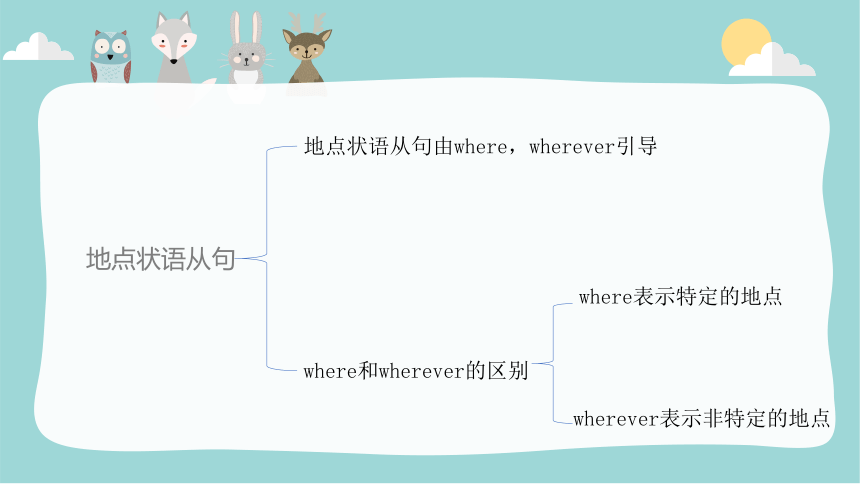
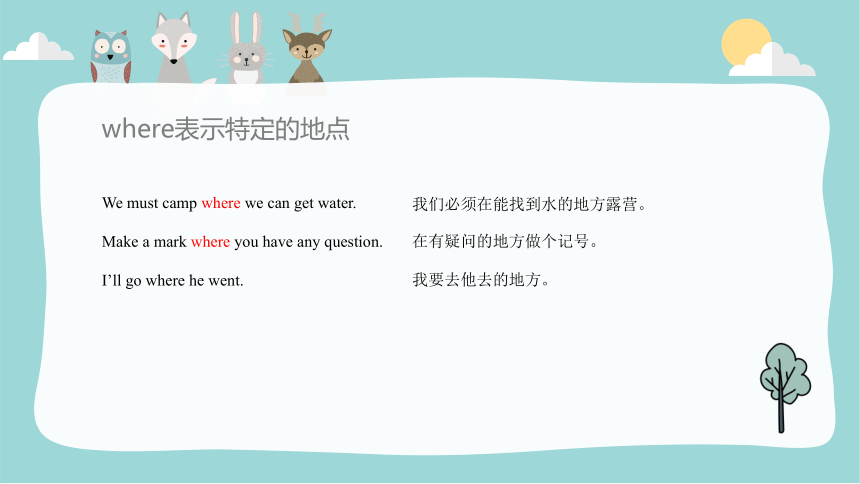


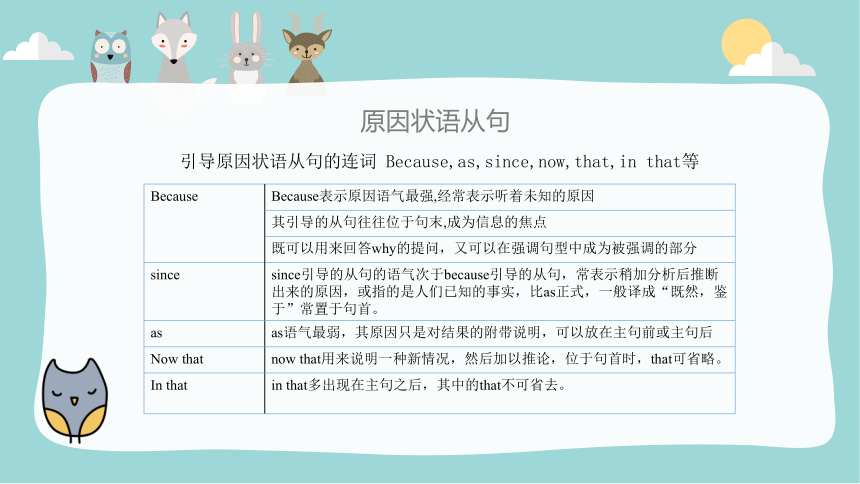

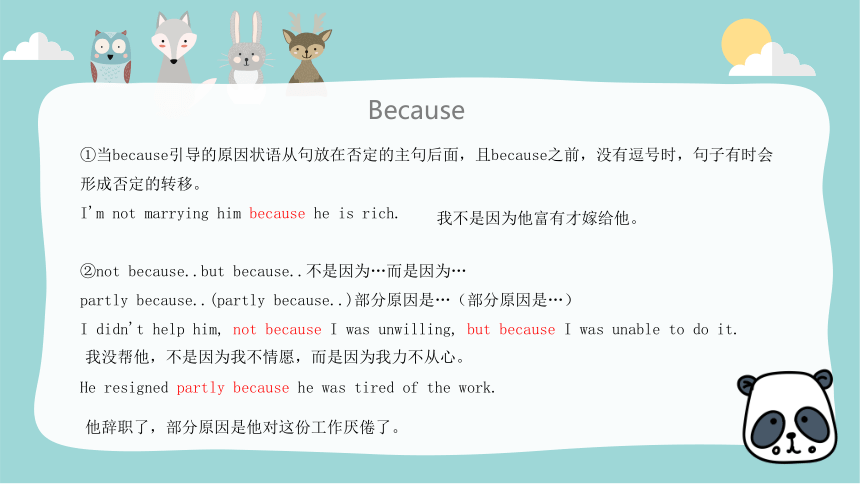


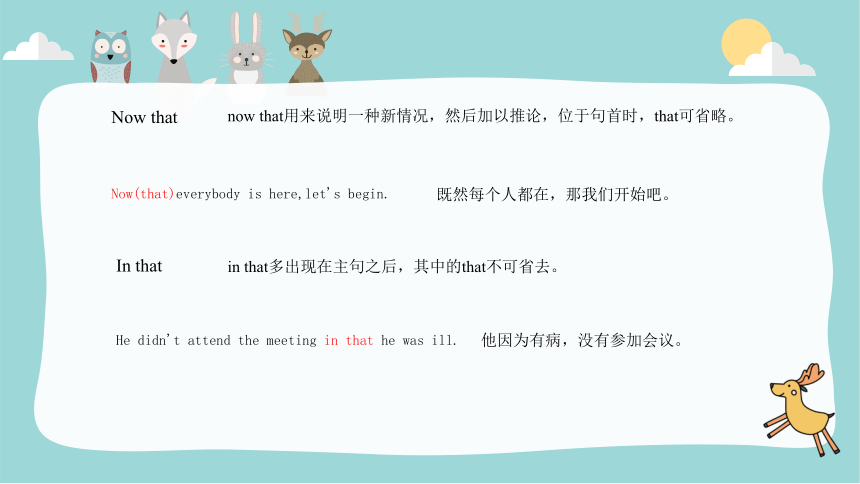
文档简介
(共56张PPT)
状语从句
地点状语从句
地点状语从句
地点状语从句由where,wherever引导
where和wherever的区别
where表示特定的地点
wherever表示非特定的地点
where表示特定的地点
We must camp where we can get water.
Make a mark where you have any question.
I’ll go where he went.
我们必须在能找到水的地方露营。
在有疑问的地方做个记号。
我要去他去的地方。
wherever表示非特定的地点
I will follow you wherever you go.
You are free to go wherever you like.
I'll go wherever he goes.
无论你到哪里我都要跟随你。
你可以到任何你喜欢去的地方。
他去哪儿我就去哪儿。
原因状语从句
原因状语从句
引导原因状语从句的连词 Because,as,since,now,that,in that等
Because Because表示原因语气最强,经常表示听着未知的原因
其引导的从句往往位于句末,成为信息的焦点
既可以用来回答why的提问,又可以在强调句型中成为被强调的部分
since since引导的从句的语气次于because引导的从句,常表示稍加分析后推断出来的原因,或指的是人们已知的事实,比as正式,一般译成“既然,鉴于”常置于句首。
as as语气最弱,其原因只是对结果的附带说明,可以放在主句前或主句后
Now that now that用来说明一种新情况,然后加以推论,位于句首时,that可省略。
In that in that多出现在主句之后,其中的that不可省去。
Because
Because表示原因语气最强,经常表示听着未知的原因,其引导的从句往往位于句末,成为信息的焦点。既可以用来回答why的提问,又可以在强调句型中成为被强调的部分。
I can't go, because I’m ill.
一Why do you have no electricity
一Because there is a power failure.
It is because you are lazy that you have lost the job.
我不能去,因为我病了。
你们为什么没电?
因为电源发生了故障。
正因为你懒惰,你才失去了工作
Because
①当because引导的原因状语从句放在否定的主句后面,且because之前,没有逗号时,句子有时会形成否定的转移。
I'm not marrying him because he is rich.
②not because..but because..不是因为…而是因为…
partly because..(partly because..)部分原因是…(部分原因是…)
I didn't help him, not because I was unwilling, but because I was unable to do it.
He resigned partly because he was tired of the work.
我不是因为他富有才嫁给他。
我没帮他,不是因为我不情愿,而是因为我力不从心。
他辞职了,部分原因是他对这份工作厌倦了。
③because和because of的区别
because是连词,引导原因状语从句,because of是介词短语,后接名词、名词性短语或动名词。
The football match was put off because it rained.
The football match was put off because of the rain.
因为下雨,足球赛被推迟了。
Since
Since I must die, I must do it.
Since no one is against it, let's carry out the plan.
As
You'd better wear strong shoes as we'll do a lot of walking.
As he wasn't ready in time, we went without him.
since引导的从句的语气次于because引导的从句,常表示稍加分析后推断出来的原因,或指的是人们已知的事实,比as正式,一般译成“既然,鉴于”常置于句首。
既然我终有一死,我一定得做这件事。
既然没有人反对,我们就执行这个计划吧。
as语气最弱,其原因只是对结果的附带说明,可以放在主句前或主句后
你最好穿结实的鞋,因为我们要走很多路。
由于他没有及时做好准备,我们没等他就走了。
Now that
Now(that)everybody is here,let's begin.
He didn't attend the meeting in that he was ill.
In that
now that用来说明一种新情况,然后加以推论,位于句首时,that可省略。
既然每个人都在,那我们开始吧。
in that多出现在主句之后,其中的that不可省去。
他因为有病,没有参加会议。
目的状语从句
目的状语从句
引导目的状语从句的连词有:so,so that,in order that,in case,for fear that等。目的状语从句中谓语通常使用情态动词can,could,may,might,should,would等。
So that so that引导目的状语从句时,在非正式语体中可省略that。
In order that in order that表示经过精心策划的目的,有时可与so that互换。
In case 以防 in case后面的从句可使用一般现在时表示将来,或使用一般过去时表示过去的将来,还可以和其他的目的状语从句一样,有一个表推定性的情态动词,in case从句可使用should,但should也可省掉。
For fear (that)/lest for fear(that)“以免(=lest)“生怕”。从句中也常借助于情态动should,might,would,may等。
注意:
目的状语从句可以用so as to, in order to等不定式短语代替,但主句和从句的主语必须一致。
So
We'll sit nearer the front so we can hear better.
So that/in order that
Come early in order that/'so that you may see him.
so that引导目的状语从句时,在非正式语体中可省略that。
in order that表示经过精心策划的目的,有时可与so that互换。
我们要坐得靠前一点,这样能听得更清楚些。
早点来以便能见到他。
In case
Take your raincoat in case it rains.
He left early in case he(should)miss the last train.
in case后面的从句可使用一般现在时表示将来,或使用一般过去时表示过去的将来,还可以和其他的目的状语从句一样,有一个表推定性的情态动词,in case从句可使用should,但should也可省掉。
注意
①in case可引导条件状语从句
It may not rain, but you‘d better take an umbrella in case.
②in case可看作是副词性短语,表示“以防万一”。
③in case of作为介词短语可有如下用法:
a.表条件,意为“万一”。In case of fire, ring the alarm bell, please.
b.表目的,意为“以防”。Keep an umbrella in case of rain. 。
可能不会下雨,但是你最好把伞带上以防万一。
如有火灾,请按警铃。
带把雨伞,以防下雨
带上你的雨衣,以防下雨。
他动身很早,以防误了最后一班火车。
For fear that
I dare not go there for fear that he might see me.
注意
He ran fast so that he might arrive there before ten o'clock.
-He ran fast so as to arrive there before ten o'clock.
He worked day and night in order that he could succeed.
He worked day and night in order to succeed.
for fear(that)“以免(=lest)“生怕”。从句中也常借助于情态should,might,would,may等。
我不敢去那儿,生怕他看到我。
他跑得很快,为了10点钟以前到那儿。
他日夜工作就是想要获得成功。
结果状语从句
结果状语从句
结果状语从句引导结果状语从句的连词有so..that,such.that,so that等。
So…that… so…that…如此…以至于… (注意: 在非正式英语中so或that有时可以省去。)
So that so that (引导的从句常用逗号与主句隔开)
such...(that) 注意
①so.that与such.that的区别:
so为副词.修饰形容词、副词,不用来修饰名词:such为形容词,用来修饰名词。
so+形容词
so+形容词+a/an+单数名词
so+副词
so many/,few+复数名词
so much./itle+不可数名词
little译作“小,可爱”时,常用such。
such+a/an+形容词+单数名词
such+形容词+复数名词
such+形容词+不可数名词
②be such that...
such在此句型中单独使用,表示程度之高。
③so that引导的目的状语从句与so that引导的结果状语从句的区别:
a.目的状语从句一般使用情态动词,结果状语从句一般不使用情态动词;
b.结果状语从句只能放在句末;
c.结果状语从句常常用逗号与主句分开。
④so/such..that与so/such..as
such...(that) 注意
The train was so full that I could hardly turn around.
注意:
She was so happy(that)she actually cried.
The wind was(so)strong that he could hardly move forward.
So…that…
so…that…如此…以至于… (注意: 在非正式英语中so或that有时可以省去。)
火车上人太多,我几乎转不过身来。
她是那么高兴,以至于她真的哭了。
风刮得如此猛烈,以致他几乎是寸步难行。
So that so that (引导的从句常用逗号与主句隔开)
Nothing more was heard of him, so that people thought that he was dead.
She worked very hard, so that she became rich in a very short time.
再没有听到他的消息,于是人们都认为他死了。
她努力工作,很快就致富了。
such...(that)
He made such an excellent speech(that)everyone admired him.
他发表了一个精彩的演讲,以至于每个人都钦佩他。
注意
①so.that与such.that的区别:
such+a/an+形容词+单数名词
such+形容词+复数名词
such+形容词+不可数名词
He is such a little boy that his parents often teach him something.
It is such nice weather that I don't like to stay at home.
They are such good students that the teacher likes them.
他是个非常可爱的男孩子,父母经常教他东西。
天气这么好,我不想待在家里。
(such和nice共同修饰weather,不可说so nice weather)
他们都是很好的学生,老师喜欢他们。(不可说so good students)
注意
①so.that与such.that的区别:
so为副词.修饰形容词、副词,不用来修饰名词;such为形容词,用来修饰名词。
so+形容词
so+形容词+a/an+单数名词
She is so honest that everybody trusts her.
=She is so honest a woman that everybody trusts her.
=She is such an honest woman that everybody trusts her.
There were so many people(=such a lot of people)in the room that we could not get in.
We can't finish so much work in such a short time.
so+副词
so many/,few+复数名词
so much./itle+不可数名词
little译作“小,可爱”时,常用such。
她非常诚实,大家都信赖她。
房间里这么多人,以致我们进不去。
我们在这么短的时间内完不成这么多的工作。(so与such在其他场合的区别也是一样的)
②be such that... such在此句型中单独使用,表示程度之高。
③so that引导的目的状语从句与so that引导的结果状语从句的区别:
a.目的状语从句一般使用情态动词,结果状语从句一般不使用情态动词;
b.结果状语从句只能放在句末;
c.结果状语从句常常用逗号与主句分开。
I'll wash the dress soon so that you can wear it tomorrow.
The roof had fallen in, so that the hut was out of use.
His bad behaviour was such that everyone disliked him.
他的行为糟透了,人人都厌恶他。
我会很快把这裙子洗一洗好让你明天穿。(目的状语从句)
屋顶塌陷,所以小屋已不能住了。(结果状语从句)
④so/such..that与so/such..as
This is so heavy a stone/such a heavy stone that no one can lift it.
This is so heavy a stone/such a heavy stone as no one can lift.
这块石头如此重,以至于无人能搬得动它。(结果状语从句)
这是一块重得无人能搬得动的石头。(定语从句,as为关系代词,作lf的宾语)
条件状语从句
条件状语从句
引导条件状语从句的连词:if,suppose/,supposing(that),unless,provided/providing(that), on condition that,only if,so/as long as,in case
if, unless if only, only if 注意
①unless不用于虚拟条件句中。
②unless与if..not常常可以互换,unless语气较强。
在unless引导的从句中,谓语不能再用否定式。
so/as long as so long as和as long as用作连词,表示“只要,如果”
in case 表示“万一”“如果”。(注意:in case可引导目的状语从句。)
suppose/.supposing(that)假定 suppose/.supposing(that).常用来提出一个假定的条件,询问可能的解决办法或可能出现的情况。故主句多为疑问句。
provided/providing(that)在…条件下,以…为条件 provided/providing引导的条件从句提出规定的条件,主句内容只有在该条件实现的情况下,才能成为事实。(provided较为常用)。
on condition(that)以…为条件,在…条件下 on condition(that)与provided/providing(that)相同,也是强调条件的提出。
“祈使句+and/or/or else/,otherwise'”引导的结果句 祈使句在意义上实际上相当于条件状语从句。
☆若假定的条件是不能实现的,就用虚拟语气
You will not pass the exam unless you study hard.
(=You will not pass the exam if you don't study hard. 如果你不努力学习,就不会通过考试。
I will come only if you promise not to invite Mary. 只有你答应不请玛丽我才来。
if, unless if only, only if
在unless引导的从句中,谓语不能再用否定式。
unless与if..not常常可以互换,unless语气较强。
unless不用于虚拟条件句中
If it is fine next Sunday, we shall have a spring outing 如果下星期日天气好,我们就去春游。
If I had enough money, I would buy the car. 如果我有足够的钱,我就买汽车了。(注意用虚拟语气)
I will go there tomorrow unless it rains/if it doesn't rain.
除非下雨,否则明天我就去那儿(要是明天不下雨我就去那儿)。
so/as long as so long as和as long as用作连词,表示“只要,如果”
I'm happy as long as you are happy.
So long as there are people, the restaurant is open.
注意
This rope is as long as that one.
That bridge is not as/so long as this one.
只要你幸福我就感到幸福。
只要有人来,餐馆就营业。
这条绳子和那条绳子一样长。
那座桥没这座桥长。
ln case he comes, let me know.
Sound the alarm bell in case a fire breaks out.
in case
表示“万一”“如果”。(注意:in case可引导目的状语从句。)
如果他来的话,告诉我一声。
万一发生火灾你就按响警铃。
suppose/.supposing(that)假定
suppose/.supposing(that).常用来提出一个假定的条件,询问可能的解决办法或可能出现的情况。故主句多为疑问句。
要是他不能来,那谁来做这项工作呢?
假定明天下雨,我们该怎么办?
假如你父亲现在看到了你,他会说什么呢?
Suppose/Supposing he can't come, who will do the work
Suppose/Supposing it rains tomorrow, what shall we do
Suppose your father saw you now, what would he say
We'll visit Europe next year, provided/providing we have the money.
I’ll go provided/providing the children can come with me.
provided/providing(that)在…条件下,以…为条件
provided/providing引导的条件从句提出规定的条件,主句内容只有在该条件实现的情况下,才能成为事实。(provided较为常用)。
如果我们有了这笔钱,我们明年将访问欧洲。
要是孩子们能跟我一起去,我就去。
Use your head, and you'll find a way.
Hurry up, or else/otherwise you'll be late.
on condition(that)以…为条件,在…条件下
on condition(that)与provided/providing(that)相同,也是强调条件的提出。
I'll allow you to go swimming on condition that you don't go too far from the bank.
我将允许你去游泳,条件是你不能游得离岸边太远。
“祈使句+and/or/or else/,otherwise'”引导的结果句
祈使句在意义上实际上相当于条件状语从句。
动动脑筋,你就会想出办法来。
快点,否则你会迟到的。
方式状语从句
方式状语从句
引导方式状语从句的词或词组有:as(像…一样,正如…);as if/as though(好像)。
As if, as though As if, as though引导的从句若与事实相反,用虚拟语气;若与事实相符,不用虚拟语气。
as it is/was as it is/was用在句首时,用来陈述真实的情况,可译为“事实上,实际情况是”。
as it is/was用在句末时,常表示“按原来的样子,照现在的样子”,若前面的名词为复数,则应改为as they are/were。
as it were as it were用作插入语,表示“仿佛,好像,可以说是”时,不可改为as it is/was。
Do as you like.
He spoke as if he had been there before.
I remember it as if it were yesterday.
Our teacher treats us as though we were her children.
As if, as though
As if, as though引导的从句若与事实相反,用虚拟语气;若与事实相符,不用虚拟语气。
你喜欢怎样做,就怎样做。
他说话的口气像是曾经到过那里似的。
我记得这件事,仿佛是昨天发生的。
我们的老师对待我们就像对待她的孩子一样。
as it is/was
as it is/was用在句首时,用来陈述真实的情况,可译为“事实上,实际情况是”。
as it is/was用在句末时,常表示“按原来的样子,照现在的样子”,若前面的名词为复数,则应改为as they are/were。
我原以为情况会好转,但事实上反而更糟了。
别动它(让它保留原来的样子)。
按照实际情况把事实摆出来。
I thought conditions would get better, but as it is they are getting worse.
Leave it as it is.
State the facts as they are.
He is, as it were, a walking dictionary.
The sky is covered, as it were, with a black curtain.
as it were
as it were用作插入语,表示“仿佛,好像,可以说是”时,不可改为as it is/was。
他可以说是本活字典。
天空仿佛覆盖着一层黑幕。
让步状语从句
让步状语从句
though和although 虽然,尽管
①though与although语义相同,两者可换用,但although比though语气强。主句中可以用yet,still, nevertheless与其呼应,但不可使用but。
②though可作副词,放在句末,意为“不过,但是”。although无此用法。
③在even though及as though中不可换用although。
even though和even if “尽管”“即使”,这两个复合连词意义相同,常用以强调让步概念,会有退一步想的意思(有时用于虚拟语气)。
whether/no matter whether...or(not) whether/no matter whether...or(not)(不管…是否,不管是…还是)
whoever/no matter who,whatever/no matter what,whichever/no matter which,whomever=no matter whom whoever/no matter who(无论谁,不管什么人);whatever/no matter what(无论什么,不管什么样的);whichever/no matter which(无论哪个);whomever=no matter whom(无论谁)
①从句中要用一般现在时表示将来。
②whatever,whoever,.whomever,whichever等可引导名词性从句,在从句中作主语、
宾语或表语;也可引导让步状语从句。而no matter what/who/whom/which等不可以引
导名词性从句,只能引导让步状语从句。
让步状语从句
however/no matter how,wherever/no matter where,whenever/no matter when however/no matter how(不管怎样);wherever/no matter where(无论在何处);whenever/no matter when(无论何时)
(注意观察这三句however后边的语序)
while while引导让步状语从句,相当于although,但一般位于主句之前。
in spite of the fact/fact that, despite the fact that, regardless of(the fact that)… 有些短语也意为“尽管”,引导一个表让步的从句或短语,如in spite of the fact/fact that, despite the fact that, regardless of(the fact that)等。
由or连接的两个意义相反的词语 某些由or连接的两个意义相反的词语,在句中也表让步。
Though/Although it was very hot, he kept on working.
He said he would help me, he didn’t, though.
though和although
虽然,尽管
①though与although语义相同,两者可换用,但although比though语气强。主句中可以用yet,still, nevertheless与其呼应,但不可使用but。
②though可作副词,放在句末,意为“不过,但是”。although无此用法。
③在even though及as though中不可换用although。
尽管天很热,他还是坚持工作。
他说他会帮我的,但是他并没有帮我。
We'll make a trip even if/though the weather is bad.
Even if I were in your place, I wouldn't take the job.
He will come even if he is ill.
I won't give up even if I should fail ten times.
even though和even if
“尽管”“即使”,这两个复合连词意义相同,常用以强调让步概念,会有退一步想的意思(有时用于虚拟语气)。
即使天气很糟糕,我们也要去旅行。
即使我在你的位置,我也不会接受这份工作。(虚拟语气)
即使他病了,他也会来的。
即使失败十次我也不会放弃。
I’ll do it whether you like it or not.
Whether we go or stay, the result is the same.
No matter whether you have time or not, you must deliver these clothes today.
No matter whether they are boys or girls, they should enjoy equal rights.
whether/no matter whether...or(not)(不管…是否,不管是…还是)
不管你是喜欢还是不喜欢,我都要做。
不管我们是去还是留,结果都是一样。
不管你是否有空儿,你今天必须去送这些衣服。
不管他们是男孩还是女孩,他们都应享有平等的权利。
Whoever/No matter who you are, you must obey the law.
Don't lose heart, whatever/no matter what happens.
You have to go on, whatever/no matter what difficulties you meet.
Whichever/No matter which book you borrow, you must return it in a week.
whoever/no matter who(无论谁,不管什么人);whatever/no matter what(无论什么,不管什么样的);whichever/no matter which(无论哪个);whomever=no matter whom(无论谁)
①从句中要用一般现在时表示将来。
不管你是谁,你得守法。
不管发生什么,都不要气馁。
无论遇到什么困难,你都得继续下去。
无论借哪本书,都必须一周内归还。
Whoever breaks the law will be punished.
Whoever gets the job will have a lot of work to do.
Whatever she wants is fine with me.
Whichever(of you)comes in first will receive a prize.
You can give the book to whomever you see in the classroom
②whatever,whoever,.whomever,whichever等可引导名词性从句,在从句中作主语、宾语或表语;也可引导让步状语从句。而no matter what/who/whom/which等不可以引导名词性从句,只能引导让步状语从句。
任何违反法律的人都将受到惩罚。(引导主语从句,在从句中作主语)
任何得到这份工作的人都将要有很多工作要做。(引导主语从句,在从句中作主语)
她无论要什么我都没意见。(引导主语从句,在从句中作宾语)
(你们之中)哪一个最先到达将得到奖品。(引导主语从句,在从句中作主语)
你在教室无论见到谁,就把书给他。(引导宾语从句,在从句中作宾语)
Whenever/No matter when you come back, don't wake me up.
He carries a book in his pocket, wherever/no matter where he goes.
However/No matter how late he is, mother will wait for him to have dinner together.
However/No matter how much you want to bathe in the sea, it just isn't safe.
However good a book it is, I just don't like it.
不管你什么时候回来,都不要吵醒我。
他不管去哪里,口袋里都带一本书。
无论他回来得多晚,妈妈总是等着他一起吃饭。
不管你多么想去洗海水澡,这总是不安全的。
不管这本书多好,我就是不喜欢它。
however/no matter how(不管怎样);wherever/no matter where(无论在何处);whenever/no matter when(无论何时)
(注意观察这三句however后边的语序)
In spite of/Despite the fact that he is sometimes selfish, we have to depend on him.
Some people act regardless of what will happen afterwards.
while引导让步状语从句,相当于although,但一般位于主句之前。
While I understand your point of view, I don't share it.
我虽然了解你的观点,但不敢苟同。
有些短语也意为“尽管”,引导一个表让步的从句或短语,如in spite of the fact/fact that, despite the fact that, regardless of(the fact that)等。
尽管他有时很自私,我们还是得依靠他。
有些人做事根本不管后果。
Right or wrong, this is my temper.
He is now over seventy years old, believe it or not.
某些由or连接的两个意义相反的词语,在句中也表让步。
不管正确与否,这是我的脾气。
信不信由你,他现已七十多岁了。
比较状语从句
比较状语从句
比较状语从句常用的从属连词有as..as(和…一样),not as/so.…as(和…不一样),than(比),the more..the more.(越…越…),而且这类从句通常以省略形式出现。
She studies harder than I(study).
The more you read, the more knowledge you can get.
He is as old as I.
她学习比我努力。
你读的书越多,你的知识越丰富。
他同我一样大。
状语从句中的省略问题
状语从句中的省略问题
1.在状语从句中如果主语与主句的主语一致,同时从句中又含有系动词be,则通常可省去从句的主语和系动词be,留下其余部分。
2.若状语从句中主语是it,动词是系动词be,则通常可省去主语it及系动词be,留下其余部分。
She stood at the gate as if(she was)waiting for someone.
The man, while(he is)over eighty, can walk faster than I.
Don't speak until(you are)spoken to.
Be careful while(you are)crossing the road.
When(itis)heated, ice can turn into water.
Once(itis)seen, it can never be forgotten.
While in Beijing, I paid a visit to the Summer Palace.
When in trouble, you can visit this man.
He often makes mistakes when speaking English.
She always sings while doing her work.
The woman teacher hurriedly left the classroom as though(she was)angry.
Though(they were)surrounded, the soldiers didn't give up.
1.在状语从句中如果主语与主句的主语一致,同时从句中又含有系动词be,则通常可省去从句的主语和系动词be,留下其余部分。
她站在门口好像在等人。
这人虽然年过八十,却比我走得快。
有人对你说话时你才说。
过马路时要当心。
冰经过加热能变成水。
一旦被看见,永远也不会被忘记。
在北京时,我参观了颐和园。
当你有麻烦时,你可以找这个人。
说英语时他常出错。
她干活时总唱歌。
这位女教师匆匆忙忙离开教室,好像生气了。
虽然士兵们被包围了,可是他们没有屈服
I'll buy a TV set if(it is)necessary.
Everything went on better than(it had been)expected.
No matter how difficult(it may be),we are determined to carry the research to the end.
Pressure can be reduced when needed.
Come tomorrow if possible.
If so, you must go back and get it.
还有:if any(如果有);if in need(如果需要)。如:
If in need, don't hesitate to ask me for money.
2.若状语从句中主语是it,动词是系动词be,则通常可省去主语it及系动词be,留下其余部分。
如有必要,我就买一台电视机。
一切进展得比预料的顺利。
必要时压力可减。
可能的话就明天来吧。
如果是这样的话,你必须回去把它拿来。
如果需要钱,不必犹豫,向我要就是了
THANKS
状语从句
地点状语从句
地点状语从句
地点状语从句由where,wherever引导
where和wherever的区别
where表示特定的地点
wherever表示非特定的地点
where表示特定的地点
We must camp where we can get water.
Make a mark where you have any question.
I’ll go where he went.
我们必须在能找到水的地方露营。
在有疑问的地方做个记号。
我要去他去的地方。
wherever表示非特定的地点
I will follow you wherever you go.
You are free to go wherever you like.
I'll go wherever he goes.
无论你到哪里我都要跟随你。
你可以到任何你喜欢去的地方。
他去哪儿我就去哪儿。
原因状语从句
原因状语从句
引导原因状语从句的连词 Because,as,since,now,that,in that等
Because Because表示原因语气最强,经常表示听着未知的原因
其引导的从句往往位于句末,成为信息的焦点
既可以用来回答why的提问,又可以在强调句型中成为被强调的部分
since since引导的从句的语气次于because引导的从句,常表示稍加分析后推断出来的原因,或指的是人们已知的事实,比as正式,一般译成“既然,鉴于”常置于句首。
as as语气最弱,其原因只是对结果的附带说明,可以放在主句前或主句后
Now that now that用来说明一种新情况,然后加以推论,位于句首时,that可省略。
In that in that多出现在主句之后,其中的that不可省去。
Because
Because表示原因语气最强,经常表示听着未知的原因,其引导的从句往往位于句末,成为信息的焦点。既可以用来回答why的提问,又可以在强调句型中成为被强调的部分。
I can't go, because I’m ill.
一Why do you have no electricity
一Because there is a power failure.
It is because you are lazy that you have lost the job.
我不能去,因为我病了。
你们为什么没电?
因为电源发生了故障。
正因为你懒惰,你才失去了工作
Because
①当because引导的原因状语从句放在否定的主句后面,且because之前,没有逗号时,句子有时会形成否定的转移。
I'm not marrying him because he is rich.
②not because..but because..不是因为…而是因为…
partly because..(partly because..)部分原因是…(部分原因是…)
I didn't help him, not because I was unwilling, but because I was unable to do it.
He resigned partly because he was tired of the work.
我不是因为他富有才嫁给他。
我没帮他,不是因为我不情愿,而是因为我力不从心。
他辞职了,部分原因是他对这份工作厌倦了。
③because和because of的区别
because是连词,引导原因状语从句,because of是介词短语,后接名词、名词性短语或动名词。
The football match was put off because it rained.
The football match was put off because of the rain.
因为下雨,足球赛被推迟了。
Since
Since I must die, I must do it.
Since no one is against it, let's carry out the plan.
As
You'd better wear strong shoes as we'll do a lot of walking.
As he wasn't ready in time, we went without him.
since引导的从句的语气次于because引导的从句,常表示稍加分析后推断出来的原因,或指的是人们已知的事实,比as正式,一般译成“既然,鉴于”常置于句首。
既然我终有一死,我一定得做这件事。
既然没有人反对,我们就执行这个计划吧。
as语气最弱,其原因只是对结果的附带说明,可以放在主句前或主句后
你最好穿结实的鞋,因为我们要走很多路。
由于他没有及时做好准备,我们没等他就走了。
Now that
Now(that)everybody is here,let's begin.
He didn't attend the meeting in that he was ill.
In that
now that用来说明一种新情况,然后加以推论,位于句首时,that可省略。
既然每个人都在,那我们开始吧。
in that多出现在主句之后,其中的that不可省去。
他因为有病,没有参加会议。
目的状语从句
目的状语从句
引导目的状语从句的连词有:so,so that,in order that,in case,for fear that等。目的状语从句中谓语通常使用情态动词can,could,may,might,should,would等。
So that so that引导目的状语从句时,在非正式语体中可省略that。
In order that in order that表示经过精心策划的目的,有时可与so that互换。
In case 以防 in case后面的从句可使用一般现在时表示将来,或使用一般过去时表示过去的将来,还可以和其他的目的状语从句一样,有一个表推定性的情态动词,in case从句可使用should,但should也可省掉。
For fear (that)/lest for fear(that)“以免(=lest)“生怕”。从句中也常借助于情态动should,might,would,may等。
注意:
目的状语从句可以用so as to, in order to等不定式短语代替,但主句和从句的主语必须一致。
So
We'll sit nearer the front so we can hear better.
So that/in order that
Come early in order that/'so that you may see him.
so that引导目的状语从句时,在非正式语体中可省略that。
in order that表示经过精心策划的目的,有时可与so that互换。
我们要坐得靠前一点,这样能听得更清楚些。
早点来以便能见到他。
In case
Take your raincoat in case it rains.
He left early in case he(should)miss the last train.
in case后面的从句可使用一般现在时表示将来,或使用一般过去时表示过去的将来,还可以和其他的目的状语从句一样,有一个表推定性的情态动词,in case从句可使用should,但should也可省掉。
注意
①in case可引导条件状语从句
It may not rain, but you‘d better take an umbrella in case.
②in case可看作是副词性短语,表示“以防万一”。
③in case of作为介词短语可有如下用法:
a.表条件,意为“万一”。In case of fire, ring the alarm bell, please.
b.表目的,意为“以防”。Keep an umbrella in case of rain. 。
可能不会下雨,但是你最好把伞带上以防万一。
如有火灾,请按警铃。
带把雨伞,以防下雨
带上你的雨衣,以防下雨。
他动身很早,以防误了最后一班火车。
For fear that
I dare not go there for fear that he might see me.
注意
He ran fast so that he might arrive there before ten o'clock.
-He ran fast so as to arrive there before ten o'clock.
He worked day and night in order that he could succeed.
He worked day and night in order to succeed.
for fear(that)“以免(=lest)“生怕”。从句中也常借助于情态should,might,would,may等。
我不敢去那儿,生怕他看到我。
他跑得很快,为了10点钟以前到那儿。
他日夜工作就是想要获得成功。
结果状语从句
结果状语从句
结果状语从句引导结果状语从句的连词有so..that,such.that,so that等。
So…that… so…that…如此…以至于… (注意: 在非正式英语中so或that有时可以省去。)
So that so that (引导的从句常用逗号与主句隔开)
such...(that) 注意
①so.that与such.that的区别:
so为副词.修饰形容词、副词,不用来修饰名词:such为形容词,用来修饰名词。
so+形容词
so+形容词+a/an+单数名词
so+副词
so many/,few+复数名词
so much./itle+不可数名词
little译作“小,可爱”时,常用such。
such+a/an+形容词+单数名词
such+形容词+复数名词
such+形容词+不可数名词
②be such that...
such在此句型中单独使用,表示程度之高。
③so that引导的目的状语从句与so that引导的结果状语从句的区别:
a.目的状语从句一般使用情态动词,结果状语从句一般不使用情态动词;
b.结果状语从句只能放在句末;
c.结果状语从句常常用逗号与主句分开。
④so/such..that与so/such..as
such...(that) 注意
The train was so full that I could hardly turn around.
注意:
She was so happy(that)she actually cried.
The wind was(so)strong that he could hardly move forward.
So…that…
so…that…如此…以至于… (注意: 在非正式英语中so或that有时可以省去。)
火车上人太多,我几乎转不过身来。
她是那么高兴,以至于她真的哭了。
风刮得如此猛烈,以致他几乎是寸步难行。
So that so that (引导的从句常用逗号与主句隔开)
Nothing more was heard of him, so that people thought that he was dead.
She worked very hard, so that she became rich in a very short time.
再没有听到他的消息,于是人们都认为他死了。
她努力工作,很快就致富了。
such...(that)
He made such an excellent speech(that)everyone admired him.
他发表了一个精彩的演讲,以至于每个人都钦佩他。
注意
①so.that与such.that的区别:
such+a/an+形容词+单数名词
such+形容词+复数名词
such+形容词+不可数名词
He is such a little boy that his parents often teach him something.
It is such nice weather that I don't like to stay at home.
They are such good students that the teacher likes them.
他是个非常可爱的男孩子,父母经常教他东西。
天气这么好,我不想待在家里。
(such和nice共同修饰weather,不可说so nice weather)
他们都是很好的学生,老师喜欢他们。(不可说so good students)
注意
①so.that与such.that的区别:
so为副词.修饰形容词、副词,不用来修饰名词;such为形容词,用来修饰名词。
so+形容词
so+形容词+a/an+单数名词
She is so honest that everybody trusts her.
=She is so honest a woman that everybody trusts her.
=She is such an honest woman that everybody trusts her.
There were so many people(=such a lot of people)in the room that we could not get in.
We can't finish so much work in such a short time.
so+副词
so many/,few+复数名词
so much./itle+不可数名词
little译作“小,可爱”时,常用such。
她非常诚实,大家都信赖她。
房间里这么多人,以致我们进不去。
我们在这么短的时间内完不成这么多的工作。(so与such在其他场合的区别也是一样的)
②be such that... such在此句型中单独使用,表示程度之高。
③so that引导的目的状语从句与so that引导的结果状语从句的区别:
a.目的状语从句一般使用情态动词,结果状语从句一般不使用情态动词;
b.结果状语从句只能放在句末;
c.结果状语从句常常用逗号与主句分开。
I'll wash the dress soon so that you can wear it tomorrow.
The roof had fallen in, so that the hut was out of use.
His bad behaviour was such that everyone disliked him.
他的行为糟透了,人人都厌恶他。
我会很快把这裙子洗一洗好让你明天穿。(目的状语从句)
屋顶塌陷,所以小屋已不能住了。(结果状语从句)
④so/such..that与so/such..as
This is so heavy a stone/such a heavy stone that no one can lift it.
This is so heavy a stone/such a heavy stone as no one can lift.
这块石头如此重,以至于无人能搬得动它。(结果状语从句)
这是一块重得无人能搬得动的石头。(定语从句,as为关系代词,作lf的宾语)
条件状语从句
条件状语从句
引导条件状语从句的连词:if,suppose/,supposing(that),unless,provided/providing(that), on condition that,only if,so/as long as,in case
if, unless if only, only if 注意
①unless不用于虚拟条件句中。
②unless与if..not常常可以互换,unless语气较强。
在unless引导的从句中,谓语不能再用否定式。
so/as long as so long as和as long as用作连词,表示“只要,如果”
in case 表示“万一”“如果”。(注意:in case可引导目的状语从句。)
suppose/.supposing(that)假定 suppose/.supposing(that).常用来提出一个假定的条件,询问可能的解决办法或可能出现的情况。故主句多为疑问句。
provided/providing(that)在…条件下,以…为条件 provided/providing引导的条件从句提出规定的条件,主句内容只有在该条件实现的情况下,才能成为事实。(provided较为常用)。
on condition(that)以…为条件,在…条件下 on condition(that)与provided/providing(that)相同,也是强调条件的提出。
“祈使句+and/or/or else/,otherwise'”引导的结果句 祈使句在意义上实际上相当于条件状语从句。
☆若假定的条件是不能实现的,就用虚拟语气
You will not pass the exam unless you study hard.
(=You will not pass the exam if you don't study hard. 如果你不努力学习,就不会通过考试。
I will come only if you promise not to invite Mary. 只有你答应不请玛丽我才来。
if, unless if only, only if
在unless引导的从句中,谓语不能再用否定式。
unless与if..not常常可以互换,unless语气较强。
unless不用于虚拟条件句中
If it is fine next Sunday, we shall have a spring outing 如果下星期日天气好,我们就去春游。
If I had enough money, I would buy the car. 如果我有足够的钱,我就买汽车了。(注意用虚拟语气)
I will go there tomorrow unless it rains/if it doesn't rain.
除非下雨,否则明天我就去那儿(要是明天不下雨我就去那儿)。
so/as long as so long as和as long as用作连词,表示“只要,如果”
I'm happy as long as you are happy.
So long as there are people, the restaurant is open.
注意
This rope is as long as that one.
That bridge is not as/so long as this one.
只要你幸福我就感到幸福。
只要有人来,餐馆就营业。
这条绳子和那条绳子一样长。
那座桥没这座桥长。
ln case he comes, let me know.
Sound the alarm bell in case a fire breaks out.
in case
表示“万一”“如果”。(注意:in case可引导目的状语从句。)
如果他来的话,告诉我一声。
万一发生火灾你就按响警铃。
suppose/.supposing(that)假定
suppose/.supposing(that).常用来提出一个假定的条件,询问可能的解决办法或可能出现的情况。故主句多为疑问句。
要是他不能来,那谁来做这项工作呢?
假定明天下雨,我们该怎么办?
假如你父亲现在看到了你,他会说什么呢?
Suppose/Supposing he can't come, who will do the work
Suppose/Supposing it rains tomorrow, what shall we do
Suppose your father saw you now, what would he say
We'll visit Europe next year, provided/providing we have the money.
I’ll go provided/providing the children can come with me.
provided/providing(that)在…条件下,以…为条件
provided/providing引导的条件从句提出规定的条件,主句内容只有在该条件实现的情况下,才能成为事实。(provided较为常用)。
如果我们有了这笔钱,我们明年将访问欧洲。
要是孩子们能跟我一起去,我就去。
Use your head, and you'll find a way.
Hurry up, or else/otherwise you'll be late.
on condition(that)以…为条件,在…条件下
on condition(that)与provided/providing(that)相同,也是强调条件的提出。
I'll allow you to go swimming on condition that you don't go too far from the bank.
我将允许你去游泳,条件是你不能游得离岸边太远。
“祈使句+and/or/or else/,otherwise'”引导的结果句
祈使句在意义上实际上相当于条件状语从句。
动动脑筋,你就会想出办法来。
快点,否则你会迟到的。
方式状语从句
方式状语从句
引导方式状语从句的词或词组有:as(像…一样,正如…);as if/as though(好像)。
As if, as though As if, as though引导的从句若与事实相反,用虚拟语气;若与事实相符,不用虚拟语气。
as it is/was as it is/was用在句首时,用来陈述真实的情况,可译为“事实上,实际情况是”。
as it is/was用在句末时,常表示“按原来的样子,照现在的样子”,若前面的名词为复数,则应改为as they are/were。
as it were as it were用作插入语,表示“仿佛,好像,可以说是”时,不可改为as it is/was。
Do as you like.
He spoke as if he had been there before.
I remember it as if it were yesterday.
Our teacher treats us as though we were her children.
As if, as though
As if, as though引导的从句若与事实相反,用虚拟语气;若与事实相符,不用虚拟语气。
你喜欢怎样做,就怎样做。
他说话的口气像是曾经到过那里似的。
我记得这件事,仿佛是昨天发生的。
我们的老师对待我们就像对待她的孩子一样。
as it is/was
as it is/was用在句首时,用来陈述真实的情况,可译为“事实上,实际情况是”。
as it is/was用在句末时,常表示“按原来的样子,照现在的样子”,若前面的名词为复数,则应改为as they are/were。
我原以为情况会好转,但事实上反而更糟了。
别动它(让它保留原来的样子)。
按照实际情况把事实摆出来。
I thought conditions would get better, but as it is they are getting worse.
Leave it as it is.
State the facts as they are.
He is, as it were, a walking dictionary.
The sky is covered, as it were, with a black curtain.
as it were
as it were用作插入语,表示“仿佛,好像,可以说是”时,不可改为as it is/was。
他可以说是本活字典。
天空仿佛覆盖着一层黑幕。
让步状语从句
让步状语从句
though和although 虽然,尽管
①though与although语义相同,两者可换用,但although比though语气强。主句中可以用yet,still, nevertheless与其呼应,但不可使用but。
②though可作副词,放在句末,意为“不过,但是”。although无此用法。
③在even though及as though中不可换用although。
even though和even if “尽管”“即使”,这两个复合连词意义相同,常用以强调让步概念,会有退一步想的意思(有时用于虚拟语气)。
whether/no matter whether...or(not) whether/no matter whether...or(not)(不管…是否,不管是…还是)
whoever/no matter who,whatever/no matter what,whichever/no matter which,whomever=no matter whom whoever/no matter who(无论谁,不管什么人);whatever/no matter what(无论什么,不管什么样的);whichever/no matter which(无论哪个);whomever=no matter whom(无论谁)
①从句中要用一般现在时表示将来。
②whatever,whoever,.whomever,whichever等可引导名词性从句,在从句中作主语、
宾语或表语;也可引导让步状语从句。而no matter what/who/whom/which等不可以引
导名词性从句,只能引导让步状语从句。
让步状语从句
however/no matter how,wherever/no matter where,whenever/no matter when however/no matter how(不管怎样);wherever/no matter where(无论在何处);whenever/no matter when(无论何时)
(注意观察这三句however后边的语序)
while while引导让步状语从句,相当于although,但一般位于主句之前。
in spite of the fact/fact that, despite the fact that, regardless of(the fact that)… 有些短语也意为“尽管”,引导一个表让步的从句或短语,如in spite of the fact/fact that, despite the fact that, regardless of(the fact that)等。
由or连接的两个意义相反的词语 某些由or连接的两个意义相反的词语,在句中也表让步。
Though/Although it was very hot, he kept on working.
He said he would help me, he didn’t, though.
though和although
虽然,尽管
①though与although语义相同,两者可换用,但although比though语气强。主句中可以用yet,still, nevertheless与其呼应,但不可使用but。
②though可作副词,放在句末,意为“不过,但是”。although无此用法。
③在even though及as though中不可换用although。
尽管天很热,他还是坚持工作。
他说他会帮我的,但是他并没有帮我。
We'll make a trip even if/though the weather is bad.
Even if I were in your place, I wouldn't take the job.
He will come even if he is ill.
I won't give up even if I should fail ten times.
even though和even if
“尽管”“即使”,这两个复合连词意义相同,常用以强调让步概念,会有退一步想的意思(有时用于虚拟语气)。
即使天气很糟糕,我们也要去旅行。
即使我在你的位置,我也不会接受这份工作。(虚拟语气)
即使他病了,他也会来的。
即使失败十次我也不会放弃。
I’ll do it whether you like it or not.
Whether we go or stay, the result is the same.
No matter whether you have time or not, you must deliver these clothes today.
No matter whether they are boys or girls, they should enjoy equal rights.
whether/no matter whether...or(not)(不管…是否,不管是…还是)
不管你是喜欢还是不喜欢,我都要做。
不管我们是去还是留,结果都是一样。
不管你是否有空儿,你今天必须去送这些衣服。
不管他们是男孩还是女孩,他们都应享有平等的权利。
Whoever/No matter who you are, you must obey the law.
Don't lose heart, whatever/no matter what happens.
You have to go on, whatever/no matter what difficulties you meet.
Whichever/No matter which book you borrow, you must return it in a week.
whoever/no matter who(无论谁,不管什么人);whatever/no matter what(无论什么,不管什么样的);whichever/no matter which(无论哪个);whomever=no matter whom(无论谁)
①从句中要用一般现在时表示将来。
不管你是谁,你得守法。
不管发生什么,都不要气馁。
无论遇到什么困难,你都得继续下去。
无论借哪本书,都必须一周内归还。
Whoever breaks the law will be punished.
Whoever gets the job will have a lot of work to do.
Whatever she wants is fine with me.
Whichever(of you)comes in first will receive a prize.
You can give the book to whomever you see in the classroom
②whatever,whoever,.whomever,whichever等可引导名词性从句,在从句中作主语、宾语或表语;也可引导让步状语从句。而no matter what/who/whom/which等不可以引导名词性从句,只能引导让步状语从句。
任何违反法律的人都将受到惩罚。(引导主语从句,在从句中作主语)
任何得到这份工作的人都将要有很多工作要做。(引导主语从句,在从句中作主语)
她无论要什么我都没意见。(引导主语从句,在从句中作宾语)
(你们之中)哪一个最先到达将得到奖品。(引导主语从句,在从句中作主语)
你在教室无论见到谁,就把书给他。(引导宾语从句,在从句中作宾语)
Whenever/No matter when you come back, don't wake me up.
He carries a book in his pocket, wherever/no matter where he goes.
However/No matter how late he is, mother will wait for him to have dinner together.
However/No matter how much you want to bathe in the sea, it just isn't safe.
However good a book it is, I just don't like it.
不管你什么时候回来,都不要吵醒我。
他不管去哪里,口袋里都带一本书。
无论他回来得多晚,妈妈总是等着他一起吃饭。
不管你多么想去洗海水澡,这总是不安全的。
不管这本书多好,我就是不喜欢它。
however/no matter how(不管怎样);wherever/no matter where(无论在何处);whenever/no matter when(无论何时)
(注意观察这三句however后边的语序)
In spite of/Despite the fact that he is sometimes selfish, we have to depend on him.
Some people act regardless of what will happen afterwards.
while引导让步状语从句,相当于although,但一般位于主句之前。
While I understand your point of view, I don't share it.
我虽然了解你的观点,但不敢苟同。
有些短语也意为“尽管”,引导一个表让步的从句或短语,如in spite of the fact/fact that, despite the fact that, regardless of(the fact that)等。
尽管他有时很自私,我们还是得依靠他。
有些人做事根本不管后果。
Right or wrong, this is my temper.
He is now over seventy years old, believe it or not.
某些由or连接的两个意义相反的词语,在句中也表让步。
不管正确与否,这是我的脾气。
信不信由你,他现已七十多岁了。
比较状语从句
比较状语从句
比较状语从句常用的从属连词有as..as(和…一样),not as/so.…as(和…不一样),than(比),the more..the more.(越…越…),而且这类从句通常以省略形式出现。
She studies harder than I(study).
The more you read, the more knowledge you can get.
He is as old as I.
她学习比我努力。
你读的书越多,你的知识越丰富。
他同我一样大。
状语从句中的省略问题
状语从句中的省略问题
1.在状语从句中如果主语与主句的主语一致,同时从句中又含有系动词be,则通常可省去从句的主语和系动词be,留下其余部分。
2.若状语从句中主语是it,动词是系动词be,则通常可省去主语it及系动词be,留下其余部分。
She stood at the gate as if(she was)waiting for someone.
The man, while(he is)over eighty, can walk faster than I.
Don't speak until(you are)spoken to.
Be careful while(you are)crossing the road.
When(itis)heated, ice can turn into water.
Once(itis)seen, it can never be forgotten.
While in Beijing, I paid a visit to the Summer Palace.
When in trouble, you can visit this man.
He often makes mistakes when speaking English.
She always sings while doing her work.
The woman teacher hurriedly left the classroom as though(she was)angry.
Though(they were)surrounded, the soldiers didn't give up.
1.在状语从句中如果主语与主句的主语一致,同时从句中又含有系动词be,则通常可省去从句的主语和系动词be,留下其余部分。
她站在门口好像在等人。
这人虽然年过八十,却比我走得快。
有人对你说话时你才说。
过马路时要当心。
冰经过加热能变成水。
一旦被看见,永远也不会被忘记。
在北京时,我参观了颐和园。
当你有麻烦时,你可以找这个人。
说英语时他常出错。
她干活时总唱歌。
这位女教师匆匆忙忙离开教室,好像生气了。
虽然士兵们被包围了,可是他们没有屈服
I'll buy a TV set if(it is)necessary.
Everything went on better than(it had been)expected.
No matter how difficult(it may be),we are determined to carry the research to the end.
Pressure can be reduced when needed.
Come tomorrow if possible.
If so, you must go back and get it.
还有:if any(如果有);if in need(如果需要)。如:
If in need, don't hesitate to ask me for money.
2.若状语从句中主语是it,动词是系动词be,则通常可省去主语it及系动词be,留下其余部分。
如有必要,我就买一台电视机。
一切进展得比预料的顺利。
必要时压力可减。
可能的话就明天来吧。
如果是这样的话,你必须回去把它拿来。
如果需要钱,不必犹豫,向我要就是了
THANKS
